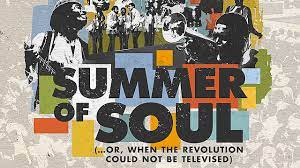Slight change in plans! Join Barb at The Movies! First night back, let’s all meet at the Esquire Theater at 6th Avenue and Downing Street in Denver on Saturday, July 10th at 6:30 p.m. to catch “Summer of Soul (…Or, When the Revolution Could Not Be Televised),” (The theater is no longer showing the Rita Moreno film. Our apologies). More on the “Summer of Soul” below.
Let Barb know if you can meet her so she’ll know who’s coming! President@coloradomusic.org
COMBO Meetings are open to the public. All ages welcome. In this case, pay for your own ticket!
# # # # #
This Stunning Film Opens a Time Capsule of Black Power
Opinion by Clay Cane, CNN | In August of 1969, a 36-year-old Nina Simone told a cheering audience at the Harlem Cultural Festival, “Are you ready to listen to all the beautiful Black voices, the beautiful Black feelings, the beautiful Black waves moving in beautiful air? Are you ready Black people? Are you ready?”
Black people were more than ready — but for the rest of the country, those words from the High Priestess of Soul were the backbone of cultural expression that was powerful (and frightening) enough to be shelved for 50 years.
“Summer of Soul (…Or, When the Revolution Could Not Be Televised),” Ahmir “Questlove” Thompson’s directorial debut, is not just a music documentary, it’s a time capsule of silenced Blackness. Fifty-two years ago this summer, the Harlem Cultural Festival took place at Mount Morris Park from June 29 to August 24, 1969.
Extensive, amazing footage of this festival, a crucial part of Harlem history, lay dormant for over 50 years. Why? It wasn’t solely because people with power in media and entertainment ignored its value. Black and brown history has always been subject to erasure in the US. The roads not taken in this complicated country are the truths we refuse to admit. Our history is threatening; what if it liberated the minds of not only Black folks but Whites as well?
Today, there are bills being proposed and passed in several states to bar the teaching of “critical race theory,” a prohibition that is code for forbidding the teaching of history that isn’t neo-Lost Cause propaganda. In this allowable version of so-called “history,” everyone — Black, White and everyone in between — would likely let “Summer of Soul” stay erased, and not ask any questions about progress since 1969.
That said, we are not doomed. “Summer of Soul (…Or, When the Revolution Could Not Be Televised)” shows us the power of optimism, unity and reinvention.
Some have wrongfully deemed the event a “Black Woodstock” (at least partially in an unsuccessful bid to market the film footage of it) but there is no comparison. Just imagine if nearly 400,000 Black people flooded a farm, high on psychedelic drugs in 1969 — they would have been in handcuffs before the first act strummed a chord.
The Woodstock Festival, which — like the moon landing and the Manson murders — was also the summer of 1969, was in part an opportunity for suburbanites to play hippies. The Harlem Cultural Festival cut deeper; it was a marker in the celebration of people who were abandoning “Negro” and proudly embracing “Black” — boldly carving out an identity that was theirs, not crafted for them by a White power structure.
Former New York Times writer Charlayne Hunter-Gault, one of the few Black women writers at the publication in 1969, said in “Summer of Soul” that she insisted on writing “Black” when she referred to Black people, instead of “Negro,” which some of her White editors fought against (until the White executive editor, Abe Rosenthal, read her memo laying out her argument, told her “you’re right,” and changed the paper’s policy). No one had ever written “Black” as a race in the New York Times before her, but Hunter-Gault demanded that change and she was heard. More importantly, she was listening to the people.
Hunter-Gault explained in the film that she took this action after listening to her community, Black people who were calling for this change.
Created and hosted by producer Tony Lawrence, the six-week festival captured an artistic revolution that should have been seen by the entire Black diaspora — but was not.
Originally filmed by filmmaker, producer and television director Hal Tulchin, who died in 2017, the footage never aired because, the film says, no television or film studios were interested in performances from Stevie Wonder, Sly and the Family Stone, Gladys Knight and the Pips, David Ruffin, Mahalia Jackson, B.B. King, Nina Simone, Moms Mabley and countless others.
Decades later, producer Robert Fyvolent gained the film and television rights and brought Roots drummer Questlove on as director. The doc, which is playing in select cities and streaming on Hulu, premiered at the 2021 Sundance Film Festival, winning the Grand Jury Prize and Audience Award in the US Documentary Competition.
> > > > > > > > > >
Read the full story here:
https://www.cnn.com/2021/07/06/opinions/summer-of-soul-black-power-cane/index.html
# # # # #
Interview with Jimmy Jam & Terry – songwriters – on CBS This Morning, 7/06/21 – new album
Jams & Lewis Vol. 1
Legendary songwriters Jimmy Jam and Terry Lewis on their first album under their names
By Gayle King, CBS News | Legendary Songwriters Jimmy Jam and Terry Lewis join “CBS This Morning” to discuss releasing their first album under their own names. They also discuss working with icons like Janet Jackson and Mariah Carey.
https://www.yahoo.com/news/legendary-songwriters-jimmy-jam-terry-133709106.html?.tsrc=fp_deeplink


